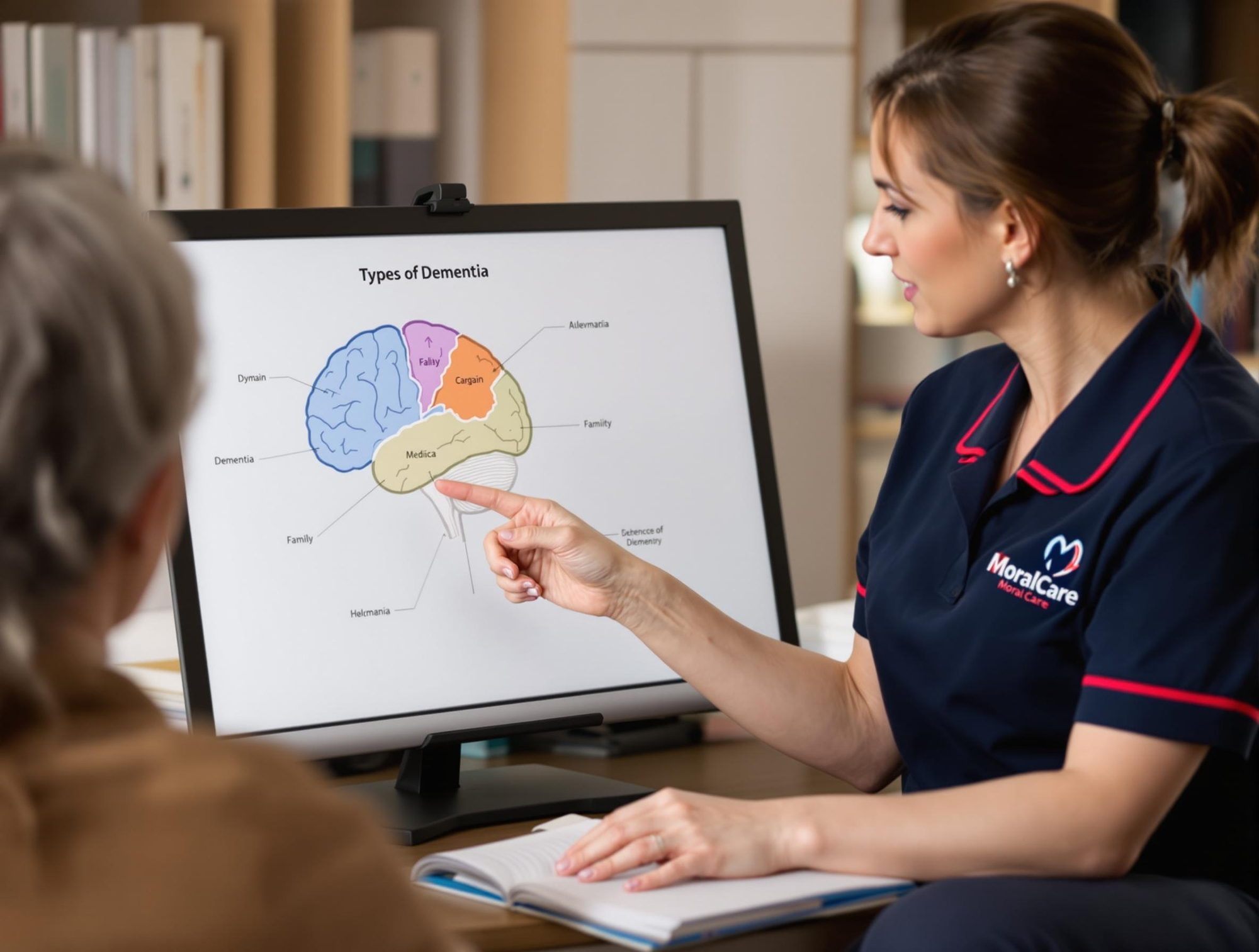Understanding the Different Types of Dementia: A Comprehensive Guide

When families hear the word "dementia," many assume it refers to a single condition. However, dementia is actually an umbrella term for a group of symptoms that affect memory, thinking, and social abilities severely enough to interfere with daily functioning. Understanding the different types of dementia is crucial for families, carers, and healthcare professionals to provide the most appropriate care and support.
At MoralCare, our 100% dementia-trained staff work with clients experiencing various forms of dementia, and we understand that each type presents unique challenges and requires tailored care approaches. Let's explore the main types of dementia, their characteristics, and how they affect individuals and families.
What is Dementia?
Dementia isn't a specific disease but rather a general term describing a decline in mental ability severe enough to interfere with daily life. It affects:
Memory and recall
Thinking and reasoning abilities
Language and communication
Visual perception
Problem-solving skills
Self-management abilities
The key distinction is that dementia goes beyond normal age-related memory changes—it significantly impacts a person's ability to function independently.
Alzheimer's Disease: The Most Common Form
Overview
Alzheimer's disease accounts for 60-80% of all dementia cases, making it the most prevalent form. It's a progressive brain disorder that slowly destroys memory and thinking skills.
Key Characteristics
Early Symptoms:
Difficulty remembering recent conversations or events
Problems with familiar tasks like cooking or managing finances
Getting lost in familiar places
Misplacing items frequently
Changes in mood or personality
Progressive Symptoms:
Severe memory loss affecting long-term memories
Difficulty recognising family members
Problems with language and communication
Confusion about time and place
Changes in sleep patterns and behaviour
Brain Changes
Alzheimer's is characterised by:
Amyloid plaques - Protein deposits that build up between brain cells
Neurofibrillary tangles - Twisted protein fibres inside brain cells
Brain shrinkage - Loss of brain tissue, particularly in areas controlling memory and thinking
Care Considerations
Maintaining familiar routines and environments
Using memory aids and visual cues
Focusing on preserved abilities rather than lost ones
Providing emotional support and reassurance
Ensuring safety whilst promoting independence
Vascular Dementia: The Second Most Common Type
Overview
Vascular dementia results from reduced blood flow to the brain, often following strokes or other conditions affecting blood circulation. It accounts for approximately 10-20% of dementia cases.
Key Characteristics
Symptoms may include:
Problems with planning and organising
Difficulty with problem-solving
Slowed thinking processes
Trouble concentrating
Mood changes and depression
Physical symptoms like weakness or paralysis
Types of Vascular Dementia
Multi-infarct dementia: Caused by multiple small strokes Single-stroke dementia: Results from one significant stroke Subcortical vascular dementia: Affects white matter deep in the brain Mixed dementia: Combination of vascular dementia and Alzheimer's
Unique Aspects
Unlike Alzheimer's, vascular dementia often:
Has a more sudden onset
Progresses in a step-wise pattern rather than gradual decline
May affect specific cognitive abilities whilst leaving others intact
Can sometimes be prevented or slowed through managing cardiovascular risk factors
Care Considerations
Managing underlying cardiovascular conditions
Encouraging physical activity as appropriate
Supporting mobility and physical therapy
Monitoring for depression and mood changes
Adapting care to fluctuating abilities
Lewy Body Dementia: Complex and Challenging
Overview
Lewy body dementia (LBD) is caused by abnormal protein deposits called Lewy bodies in the brain. It includes both dementia with Lewy bodies (DLB) and Parkinson's disease dementia.
Key Characteristics
Cognitive symptoms:
Fluctuating attention and alertness
Visual hallucinations (often detailed and realistic)
Problems with executive function
Memory problems (though often less severe than in Alzheimer's initially)
Physical symptoms:
Parkinson's-like movement problems (tremor, rigidity, slow movement)
Balance problems and frequent falls
Sleep disturbances, including acting out dreams
Autonomic dysfunction (blood pressure, temperature regulation)
Unique Challenges
Fluctuating cognition - Good days and bad days can vary dramatically
Medication sensitivity - Particularly to antipsychotic medications
Complex symptoms - Combination of cognitive, physical, and psychiatric symptoms
Misdiagnosis risk - Often confused with Parkinson's disease or Alzheimer's
Care Considerations
Adapting to daily fluctuations in ability
Managing hallucinations with understanding rather than confrontation
Ensuring safety due to movement and balance issues
Coordinating with multiple healthcare specialists
Supporting sleep hygiene and routine
Frontotemporal Dementia: Affecting Personality and Behaviour
Overview
Frontotemporal dementia (FTD) affects the frontal and temporal lobes of the brain, areas responsible for personality, behaviour, and language. It typically affects people aged 45-65.
Types of FTD
Behavioural variant FTD:
Changes in personality and behaviour
Loss of empathy and social awareness
Inappropriate social behaviour
Compulsive or repetitive behaviours
Primary progressive aphasia:
Problems with language and speech
Difficulty finding words
Grammar and comprehension issues
Reading and writing difficulties
Semantic dementia:
Loss of word meaning
Difficulty recognising familiar objects
Problems with general knowledge
Unique Challenges
Often affects younger people with families and careers
Dramatic personality changes can be distressing for families
May be misdiagnosed as psychiatric conditions
Physical abilities often remain intact initially
Care Considerations
Managing challenging behaviours with patience and understanding
Maintaining structure and routine
Supporting communication as language abilities change
Providing family support and education
Coordinating with speech and language therapists
Mixed Dementia: Multiple Conditions
Overview
Mixed dementia occurs when someone has more than one type of dementia simultaneously. The most common combination is Alzheimer's disease and vascular dementia.
Characteristics
Symptoms may overlap and interact
Progression can be unpredictable
Diagnosis may be challenging
Treatment approaches need to address multiple conditions
Care Implications
Comprehensive assessment of all symptoms
Flexible care approaches
Regular monitoring and adjustment of care plans
Coordination between different healthcare professionals
Less Common Types of Dementia
Huntington's Disease
Inherited genetic disorder
Combines dementia with movement disorders
Typically affects people aged 30-50
Requires genetic counselling and family support
Creutzfeldt-Jakob Disease (CJD)
Rare, rapidly progressive dementia
Caused by abnormal proteins called prions
Very quick decline over months rather than years
Requires specialist medical care
Normal Pressure Hydrocephalus
Caused by excess cerebrospinal fluid in the brain
Symptoms include dementia, walking difficulties, and incontinence
Sometimes treatable with surgical intervention
Requires prompt medical evaluation
Alcohol-Related Dementia
Results from long-term alcohol abuse
May be partially reversible with abstinence
Often affects younger people
Requires addiction support alongside dementia care
Early Warning Signs: When to Seek Help
Memory Changes Beyond Normal Ageing
Normal ageing: Occasionally forgetting names or appointments but remembering later Dementia concern: Forgetting recently learned information, important dates, or asking for the same information repeatedly
Difficulty with Familiar Tasks
Normal ageing: Needing help with technology or new procedures Dementia concern: Trouble with familiar tasks like cooking, driving familiar routes, or managing finances
Language Problems
Normal ageing: Occasionally struggling to find the right word Dementia concern: Frequent problems with vocabulary, calling things by wrong names, or stopping mid-conversation
Disorientation
Normal ageing: Momentary confusion about the day of the week Dementia concern: Getting lost in familiar places or losing track of dates and seasons
Changes in Judgement
Normal ageing: Making occasional poor decisions Dementia concern: Poor judgement with money, neglecting personal hygiene, or inappropriate social behaviour
The Importance of Early Diagnosis
Benefits of Early Diagnosis
Treatment options: Some medications can slow progression in certain types
Planning opportunities: Time to make legal and financial arrangements
Support access: Earlier connection with support services and resources
Family preparation: Time for families to learn and adapt
Safety planning: Implementing safety measures before crises occur
Diagnostic Process
Initial assessment: GP evaluation and basic cognitive tests Specialist referral: Memory clinic or consultant assessment Comprehensive testing: Cognitive assessments, brain scans, blood tests Ongoing monitoring: Regular reviews to track progression and adjust care
Living Well with Different Types of Dementia
Person-Centred Care Approaches
For Alzheimer's Disease:
Focus on preserved memories and abilities
Use familiar objects and photographs as memory aids
Maintain consistent routines and environments
Provide gentle reminders and support
For Vascular Dementia:
Adapt to fluctuating abilities
Support physical health and mobility
Break tasks into manageable steps
Monitor for depression and provide emotional support
For Lewy Body Dementia:
Plan activities for times when alertness is highest
Understand and manage hallucinations sensitively
Ensure safety due to movement difficulties
Support sleep routines and manage fatigue
For Frontotemporal Dementia:
Manage behavioural changes with patience
Maintain structure and predictability
Support communication as language changes
Provide family education and support
The Role of Professional Care
Why Specialist Dementia Care Matters
At MoralCare, our understanding of different dementia types enables us to:
Provide Tailored Care:
Adapt approaches based on specific dementia type
Recognise and respond to unique symptoms
Adjust care as conditions progress
Support both cognitive and physical needs
Support Families:
Educate about specific dementia types
Provide practical care strategies
Offer emotional support and understanding
Connect families with appropriate resources
Ensure Safety:
Implement appropriate safety measures for each condition
Monitor for changes in symptoms or abilities
Coordinate with healthcare professionals
Manage complex medication regimens
Comprehensive Care Planning
Our care planning considers:
Specific dementia type and stage
Individual symptoms and abilities
Personal history and preferences
Family dynamics and support systems
Safety requirements and risk factors
Future care needs and progression
Supporting Families Through Different Dementia Journeys
Understanding the Emotional Impact
Each type of dementia presents unique challenges for families:
Alzheimer's families may struggle with gradual loss of recognition and shared memories Vascular dementia families may find the unpredictable progression difficult to manage Lewy body families often cope with complex, fluctuating symptoms Frontotemporal families may find personality changes particularly distressing
Providing Ongoing Support
Regular family meetings to discuss care and concerns
Education about specific dementia types and progression
Emotional support and counselling referrals
Practical assistance with care techniques
Respite care to prevent carer burnout
Connection with support groups and resources
Future Planning Considerations
Legal and Financial Planning
Regardless of dementia type, early planning should include:
Lasting Power of Attorney for health and finance (£82 per application)
Advance directives about future care preferences
Will preparation whilst capacity remains
Financial planning for future care costs
Benefit applications for available support
Care Progression Planning
Discussing future care preferences
Identifying potential safety concerns
Planning for increased support needs
Considering respite and family support
Preparing for end-of-life care decisions
Conclusion: Every Type of Dementia Deserves Understanding
Understanding the different types of dementia is crucial for providing appropriate, compassionate care. While each type presents unique challenges, they all share common threads: the need for dignity, respect, individualised care, and family support.
At MoralCare, we believe that regardless of the type of dementia someone experiences, they deserve to live as well as possible, maintaining their independence and dignity for as long as possible. Our 100% dementia-trained staff understand that effective care isn't one-size-fits-all—it requires knowledge, flexibility, and genuine compassion.
Whether someone is living with Alzheimer's disease, vascular dementia, Lewy body dementia, frontotemporal dementia, or any other form, the goal remains the same: supporting them to live safely and happily at home, surrounded by the people and places they love.
Early diagnosis, appropriate support, and specialist care can make an enormous difference to quality of life for both individuals with dementia and their families. If you're concerned about dementia symptoms in yourself or a loved one, don't wait—seek professional advice and support as early as possible.
Remember, a dementia diagnosis isn't the end of life—it's the beginning of a different chapter that, with the right support and understanding, can still be filled with meaning, connection, and joy.
If you're concerned about dementia symptoms or need specialist dementia care support, contact MoralCare on 01524 874110. Our experienced, dementia-trained team can provide the expert care and family support you need, whatever type of dementia you're facing.

Comments